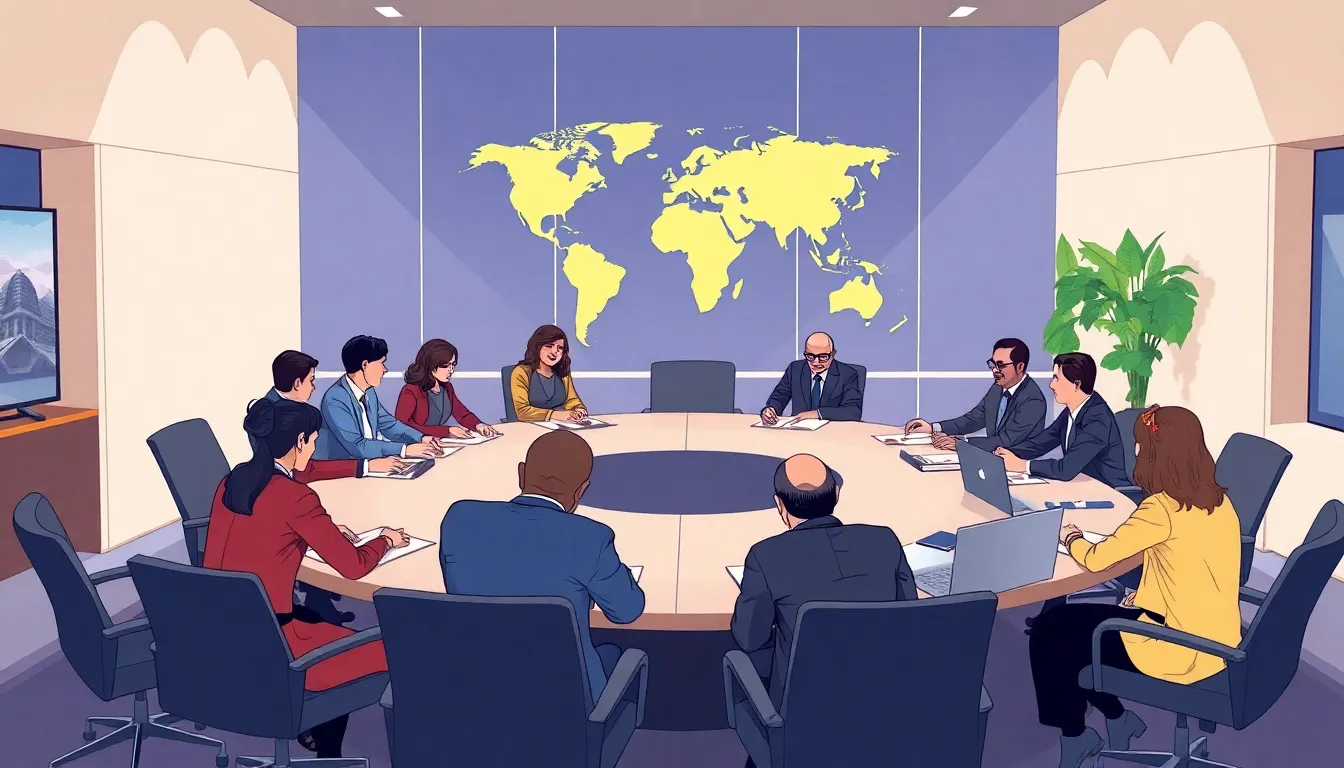In a world that’s constantly buzzing with news, debates, and the occasional viral cat video, understanding global affairs is more important than ever. But what exactly does “global affairs” mean? It’s not just a fancy term thrown around at cocktail parties; it’s the intricate web of international relations, politics, economics, and cultures that shapes our lives.
Imagine trying to navigate a maze blindfolded—that’s what it feels like to tackle global issues without a solid grasp of their definitions. From trade agreements to climate change, global affairs encompasses the challenges and triumphs that connect us all. So buckle up as we dive into the fascinating world of global affairs and unravel its meaning, one engaging tidbit at a time. Who knew learning could be this fun?
Table of Contents
ToggleUnderstanding Global Affairs
Global affairs encompasses a range of international interactions that shape societies. Understanding these dynamics is crucial for grasping the complexities of today’s interconnected world.
Definition of Global Affairs
Global affairs refers to the array of interactions between countries, organizations, and cultures. It includes international relations, economic policies, social issues, and environmental challenges, all of which influence global stability. Definitions may vary, but this term often captures the multifaceted nature of a rapidly changing world. Reports from Think Tanks and international organizations frequently highlight how global affairs impact domestic policy and citizen lives. Engaging with global affairs opens pathways for better comprehension of geopolitical shifts and their ramifications.
Key Components of Global Affairs
Key components of global affairs consist of several essential elements. International relations play a primary role, as nations negotiate treaties and alliances that affect global stability. Economics, including trade agreements and financial markets, significantly influences national growth and development. Culture also holds importance, shaping how societies interact and perceive one another. Furthermore, security issues, such as terrorism and cyber threats, necessitate worldwide collaboration. Legacy institutions like the United Nations and World Bank provide frameworks for discussion and resolution. Each component contributes to a more profound understanding of global affairs and their interconnected nature.
Historical Context

Understanding the historical context of global affairs provides insights into the dynamics shaping international relations and cultures. The evolution of global affairs reflects shifting power structures and changing political landscapes.
Evolution of Global Affairs
Global affairs evolved considerably since the establishment of nation-states in the 17th century. Early interactions focused on trade and territorial disputes. The 20th century saw the rise of global organizations like the United Nations, emphasizing cooperation and diplomacy. Post-Cold War dynamics shifted attention toward economic globalization and interconnectedness. The increasing importance of non-state actors, such as multinational corporations and NGOs, marked a new phase of influence in international relations. Technological advancements further accelerated the pace of global communication and collaboration.
Major Global Events Influencing Global Affairs
Major events significantly influenced the trajectory of global affairs. World War I and II reshaped political boundaries and alliances, leading to the emergence of the Cold War. The fall of the Berlin Wall in 1989 symbolized the end of ideological divisions, opening pathways for increased cooperation. The 9/11 attacks in 2001 shifted focus to security concerns and counter-terrorism efforts. The global financial crisis in 2008 highlighted economic interdependence among nations. Climate change discussions have gained prominence, challenging governments to collaborate on environmental policies. Each event underscored the necessity of understanding global contexts to navigate contemporary challenges.
Importance of Global Affairs
Understanding global affairs shapes perspectives on crucial issues in an interconnected world. Engaging with this topic enhances awareness of international dynamics and their implications.
Impact on International Relations
Global affairs significantly influence international relations by framing diplomacy and alliances. Countries shape their foreign policies in response to global events. Cooperation among nations promotes peace and stability, while conflicts can arise from competition over resources or ideology. The role of global organizations, such as the United Nations, is vital in facilitating dialogue, conflict resolution, and collaboration on pressing issues. Notably, the interconnected nature of today’s political landscape amplifies the consequences of each nation’s actions on others. Thus, awareness of global affairs fosters informed discourse about international strategies and relations.
Economic and Cultural Implications
Economic policies illustrate the profound impact of global affairs on national economies. Trade agreements enable countries to access markets and resources, promoting growth and innovation. Cultural exchanges enrich societies, allowing diverse perspectives to flourish. Globalization influences how local cultures interact with one another, simultaneously preserving traditions and embracing change. Economic interdependence creates vulnerabilities, as global events can affect local markets and employment. Understanding these dynamics helps individuals appreciate the complexities of cultural interactions in a globalized world. Thus, recognition of the economic and cultural implications of global affairs enhances a person’s global perspective.
Current Trends in Global Affairs
Current trends in global affairs highlight key shifts and developments that shape international interactions. Analyzing these trends provides insight into the complexities of global dynamics.
Globalization and its Effects
Globalization involves the acceleration of trade, investment, and cultural exchange across nations. It enhances economic growth and increases access to resources and markets. This interconnectedness affects local cultures, sometimes leading to cultural homogenization. Countries face both opportunities and challenges; economic dependencies may arise, making national economies vulnerable to global fluctuations. Globalization also amplifies issues like income inequality, as wealth distribution becomes uneven within and among nations. Understanding these effects is essential for navigating today’s political and economic landscapes.
Role of Technology in Global Affairs
Technology significantly influences global affairs by reshaping communication and information dissemination. Innovations in social media enable instant interaction among people and organizations worldwide. This immediacy fosters new opportunities for collaboration and activism, raising awareness about social and political issues. Additionally, advancements in cybersecurity pose challenges for nations, as cyber threats can disrupt economies and national security. Emerging technologies, such as artificial intelligence, also impact diplomacy by changing the nature of military and strategic engagements. Recognizing these technological trends remains crucial for adapting to the evolving landscape of global relations.
Understanding global affairs is essential for navigating the complexities of today’s interconnected world. It shapes perspectives on international relations and influences economic and cultural dynamics. By engaging with these topics, individuals can better comprehend the ramifications of geopolitical shifts and the importance of collaboration among nations.
As global issues continue to evolve, so do the frameworks that govern them. Staying informed about current trends and historical contexts allows for a deeper appreciation of the challenges and opportunities that arise in global affairs. This knowledge not only enriches personal insights but also fosters a more informed and engaged global citizenry.







